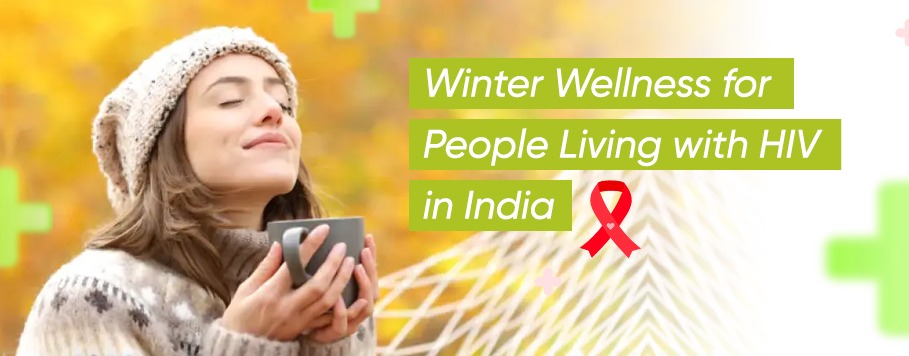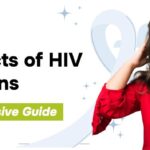For PLHIV, the immune system is often already compromised, and winter can exacerbate this. Cold weather can weaken the body’s defense mechanisms, making individuals more susceptible to seasonal infections such as the flu, colds, and respiratory issues. Additionally, reduced sunlight exposure during winter can lead to Vitamin D deficiency, further impacting immune health.
Children and adolescents living with HIV may be particularly vulnerable, as their immune systems are still developing. They may face an increased risk of infections and complications during winter, making preventive care even more crucial.
Health Tips for PLHIV During Winter
- Prioritize Nutrition: A balanced diet is essential for managing HIV health in winter. Include foods rich in Vitamin D, such as fatty fish, fortified cereals, and eggs, to counter the effects of reduced sunlight. Nutrient-dense foods like fruits, vegetables, whole grains, and lean proteins can also strengthen the immune system. For children, incorporating fortified milk and child-friendly supplements can be beneficial.
- Stay Active: Exercise is crucial for maintaining overall health. Indoor activities like yoga or light resistance training can help improve circulation and boost mood. For children and adolescents, fun indoor exercises or active games can keep them engaged and physically active during winter. Regular exercise also supports mental health, which can be affected by Seasonal Affective Disorder (SAD).
- Protect Against Seasonal Infections: Vaccinations for the flu and pneumonia are particularly important for PLHIV, including children and adolescents. Simple precautions like wearing warm clothing, washing hands frequently, and avoiding crowded spaces can help reduce exposure to infections.
- Manage Vitamin D Deficiency: Vitamin D is critical for immune health, especially for those living with HIV. In addition to dietary sources, consider taking supplements after consulting your healthcare provider. Sunlight exposure, even during winter, can also help maintain Vitamin D levels. Children and adolescents should be encouraged to spend short, supervised periods outside in the sun, when possible.
- Support Mental Health: Winter can lead to feelings of isolation and depression, which are common among HIV patients. Engaging in hobbies, staying connected with loved ones, and seeking professional support when needed can make a significant difference. Adolescents may benefit from peer support groups where they can share their experiences and feelings.
Cold Weather and HIV: Key Challenges
- Respiratory Infections: Cold weather increases the risk of respiratory infections, which can be more severe for PLHIV. Regular health check-ups and prompt treatment of symptoms are crucial. Parents and caregivers should be vigilant about early signs of illness in children.
- Seasonal Affective Disorder (SAD): Reduced daylight can trigger depressive episodes. Light therapy, outdoor activities, and counseling can help alleviate symptoms. Adolescents may require tailored interventions to address their emotional well-being.
- Energy Levels: Winter often brings fatigue, which can be compounded by HIV treatment side effects. Staying hydrated and getting enough sleep can help combat this. Ensuring children maintain a consistent routine can also help manage fatigue.
Managing HIV Treatment During Winter
Adhering to HIV treatment protocols is essential year-round. In India, the availability of the latest HIV treatment options ensures effective management of the condition. However, the cost of treatment can be a concern for many. Government programs and NGOs offer support to make HIV treatment more accessible. For children and adolescents, caregivers should ensure timely medication and regular follow-ups with healthcare providers.
Preventing HIV Transmission in Winter
Prevention of HIV transmission remains a priority, regardless of the season. Using protection during sexual activity, avoiding sharing needles, and regular testing are fundamental steps. Education and awareness programs can further reduce the stigma and spread of HIV/AIDS. Special efforts should be made to educate adolescents about prevention strategies in an age-appropriate manner.
Coping with Seasonal Affective Disorder (SAD) and HIV
For PLHIV, mental health challenges can be amplified during winter. Practicing mindfulness, maintaining a routine, and seeking therapy can help. Community support groups can also provide a safe space to share experiences and coping strategies. Adolescents may benefit from counseling tailored to their age group to help them navigate both HIV management and seasonal mental health challenges.
Why Winter Wellness Matters for PLHIV
Winter presents unique health challenges for individuals living with HIV, including children and adolescents, but proactive measures can make a significant difference. By focusing on nutrition, exercise, mental health, and adherence to treatment, PLHIV can navigate the colder months with resilience and strength.
Let’s work together to ensure that everyone, regardless of their health condition, can enjoy a healthy and fulfilling winter season. Remember, managing HIV is not just about treatment but also about embracing a holistic approach to health and well-being.
This blog article shares general information on various topics. It is not a substitute for professional advice and is intended for informational and educational purposes only.
Please use individual discretion and judgment when applying any suggestions from the blog.






2 Comments
Hi my friend! I want to say that this post is awesome, nice written and include almost all important infos. I would like to look extra posts like this .
wonderful post, very informative. I wonder why the other experts of this sector don’t notice this. You should continue your writing. I am sure, you’ve a great readers’ base already!